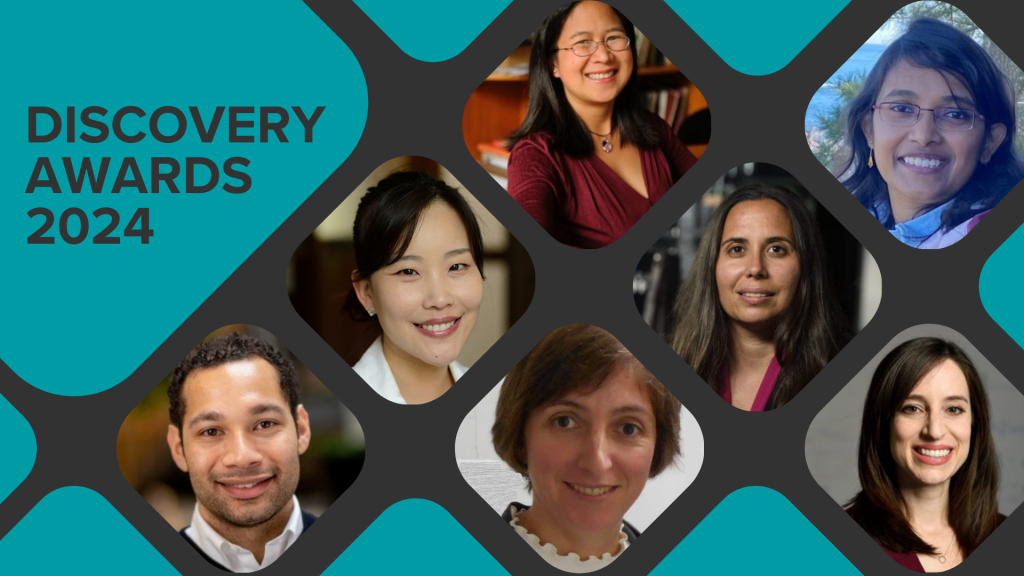Jun 24, 2024 | No Comments | By Sarah Preis

Creating DNA-based hydrogel bioinks with enhanced mechanical properties for advanced 3D bioprinting applications, such as smart bandages, biosensors, and water filtration membranes. Gaining a better understanding of how trust in the health care system is formed and how it influences patient behavior and outcomes, with the goal of identifying strategies to improve trust and, consequently, public health. Designing a novel influenza vaccine to overcome the challenges of immunosenescence and inflammaging in the elderly, which currently limit the effectiveness of seasonal influenza vaccines.
These are among 44 multidisciplinary endeavors that have been selected to receive support this year from Johns Hopkins University’s Discovery Awards program. Each project team is made up of members from at least two JHU entities who aim to solve a complex problem and expand the horizons of knowledge.
Altogether, the winning project teams—chosen from a record 286 proposals—include 148 individuals representing 11 Johns Hopkins entities.
“As society confronts challenges of increasing complexity, we require solutions that engage different disciplinary perspectives,” JHU President Ron Daniels said. “This year’s Discovery Awards recipients draw on the remarkable strengths of our faculty across our one university, forging new and impactful collaborations with the potential to improve health care, combat climate change, and harness the power of artificial intelligence.”
The Discovery Awards program was launched in early 2015, as was the Catalyst Awards program for early-career researchers. Together the two programs represent a $45 million commitment by university leadership, in tandem with deans and directors of JHU’s divisions, to faculty-led research.
The Discovery Awards are intended to spark new interactions among investigators across the university rather than to support established projects. Teams can apply for up to $100,000 to explore a new area of collaborative work with special emphasis on preparing for an externally funded large-scale grant or cooperative agreement.
“Cross-disciplinary collaboration is vital for solving society’s greatest challenges, from developing innovative health technologies to confronting climate change,” Provost Ray Jayawardhana said. “The Discovery Awards foster those crucial partnerships across Johns Hopkins, unleashing the creative potential of our scholars to drive transformative research. Congratulations to the 2024 awardees!”
This year the Discovery Awards joined forces with the Hopkins Business of Health Initiative, Data Science & AI Institute, Institute for Assured Autonomy, OneNeuro Initiative, and Ralph O’Connor Sustainable Energy Institute to award additional seed funding to related projects. Awarded teams include faculty from computer science, environmental health & engineering, history, materials science & engineering, and research & exploratory development.
The Discovery/DSAI co-funded project “Large Language Models (LLMs) for Knowledge Discovery in the Opioid Industry Documents Archive” brings together the schools of Engineering, Public Health, and Arts & Sciences to develop innovative methods for open-ended corpus analysis using LLMs to analyze the vast Opioid Industry Documents Archive (OIDA). The team aims to uncover key structural determinants of the crisis, such as marketing strategies, prescribing practices, and regulatory failures, while validating their approach by recreating codebooks and analyzing the robustness and consistency of the LLM outputs. The insights gained from this groundbreaking study have the potential to shed new light on the complex factors contributing to the opioid epidemic and inform policy decisions to address this pressing public health issue.
“The Discovery Awards program leverages Hopkins’s unique collaborative culture to support important research ideas at the interface of disciplines,” says Denis Wirtz, vice provost for research. “Expert reviewers helped select the most meritorious ideas from groups of faculty in all divisions of the university, a tall order given the extremely high quality of the proposals this year.”
Teams featuring HEMI Fellows include:
- 3D-LAMMBS: Data-Driven, Deep Learning Architectures for Multiscale Modeling of Biological Systems – Michael Lapera (Applied Physics Lab), Melissa Yates (Applied Physics Lab), Vicky Nguyen (Engineering) & Somdatta Goswami (Engineering) *Co-Funded with the Data Science and AI Institute*
- Advancing Brain Tumor Immunotherapy Informed by Circulating Tumor Cell-Derived Membrane Fragments – Jelani Zarif (Medicine), Claire Hur (Engineering), David Kamson (Medicine) & Stavroula Sofou (Engineering)
- DNA Bioinks for Next-Generation 3D Bioprinting – Angelo Cangialosi (Applied Physics Lab) & Rebecca Schulman (Engineering)
- Harnessing Single-Atom Plasmonic Catalysis for High-Efficiency Energy Transformations – Anthony Shoji Hall (Engineering) & Thomas Kempa (Arts & Sciences) *Co-Funded with the Ralph O’Connor Sustainable Energy Institute*
- Identification of Molecular and Cellular Mechanisms Regulating Sleep Need Using Automated, Selective and Non-stressful Sleep Deprivation in larval Zebrafish – Seth Blackshaw (Medicine), Claire Hur (Engineering) & Mark Wu (Medicine) *Co-Funded with the OneNeuro Initiative*
- Plasmonic Probe and Control of Topological Magnetic States – Natalia Drichko (Arts & Sciences) & Susanna Thon (Engineering)
The full list of recipients and their projects is available on the Office of Research website.




Leave a Reply